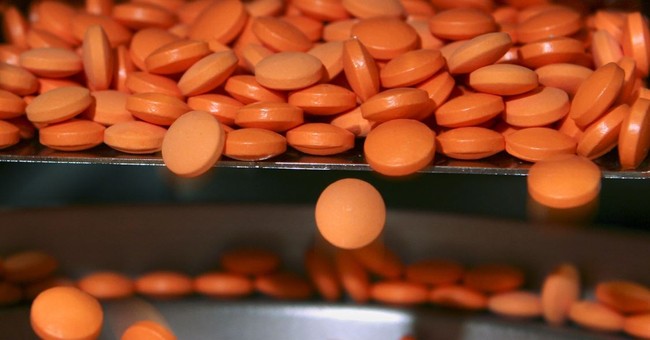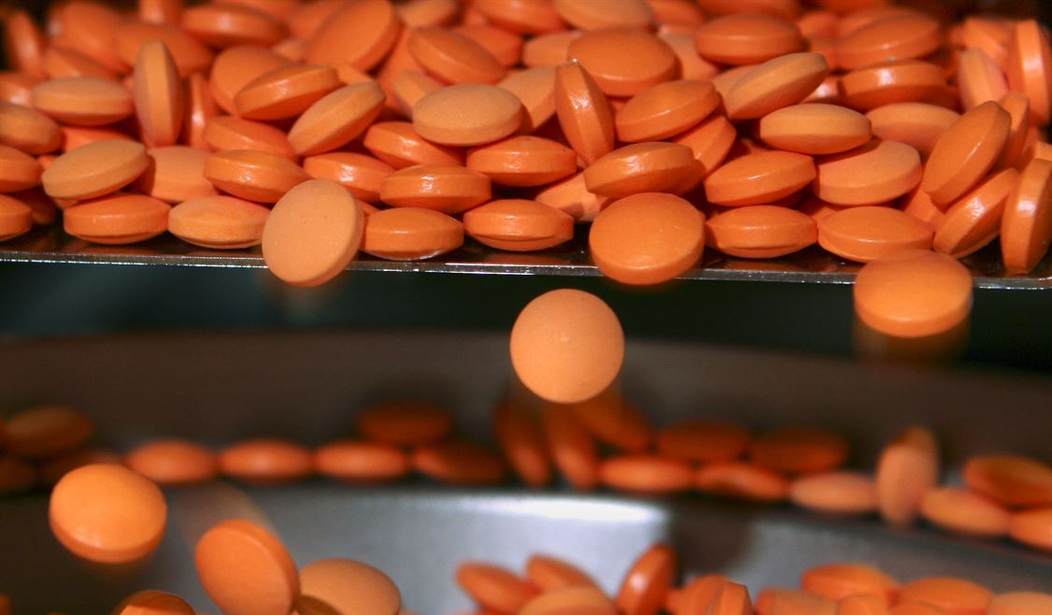
FILE – In this March 21, 2006 file photo, pills move through a precision weighing machine at a pharmaceutical manufacturers trade show in New York. A federal watchdog agency says thousands of foster children may be getting powerful psychiatric drugs prescribed to them without required safeguards. (AP Photo/Mark Lennihan)
(Dr. Jeff Colyer is a practicing physician and is currently the chairman of the National Advisory Commission on Rural Health. Dr. Daniel Hinthorn is the director of the Division of Infectious Disease at the University of Kansas Medical Center.)
Last week, several small studies reported promising results in the fight against the Chinese virus through the use of hydroxychloroquine, a generic, anti-viral drug used to treat lupus, arthritis and malaria.” Doctors in France, South Korea and the U.S. have prescribed it to Covid-19 patients and have reported success. President Trump spoke about this drug used in combination with azithromycin.
In a Monday op-ed, Dr. Colyer and Dr. Hinthorn, write that they are treating their Covid-19 patients with hydroxychoroquine and report that “the therapy appears to be making a difference. It isn’t a silver bullet, but if deployed quickly and strategically the drug could potentially help bend the pandemic’s “hockey stick” curve.” Drs. Colyer and Hinthorn write:
The medication, whose brand name is Plaquenil, is relatively safe, with the main side effect being stomach irritation, though it can cause echocardiogram and vision changes. In 2005, a Centers for Disease Control and Prevention study showed that chloroquine, an analogue, could block a virus from penetrating a cell if administered before exposure. If tissue had already been infected, the drug inhibited the virus.
On March 9 a team of researchers in China published results showing hydroxychloroquine was effective against the 2019 coronavirus in a test tube. The authors suggested a five-day, 12-pill treatment for Covid-19: two 200-milligram tablets twice a day on the first day followed by one tablet twice a day for four more days.
A more recent French study used the drug in combination with azithromycin. Most Americans know azithromycin as the brand name Zithromax Z-Pak, prescribed for upper respiratory infections. The Z-Pak alone doesn’t appear to help fight Covid-19, and the findings of combination treatment are preliminary.
But researchers in France treated a small number of patients with both hydroxychloroquine and a Z-Pak, and 100% of them were cured by day six of treatment. Compare that with 57.1% of patients treated with hydroxychloroquine alone, and 12.5% of patients who received neither.
What’s more, most patients cleared the virus in three to six days rather than the 20 days observed in China. That reduces the time a patient can spread the virus to others. One lesson that should inform the U.S. approach: Use this treatment cocktail early, and don’t wait until a patient is on a ventilator in the intensive-care unit.
The most important point the doctors make is that we don’t have the luxury of time. There are currently larger studies being conducted, but the results won’t be available for weeks. They explain, “We have a drug with an excellent safety profile but limited clinical outcomes—and no better alternatives until long after this disaster peaks. We can use this treatment to help save lives and prevent others from becoming infected. Or we can wait several weeks and risk discovering we didn’t do everything we could to end this pandemic as quickly as possible.” It will also help contain the spread of the disease.
They have begun using hydroxychloroquine in combination with azithromycin, or as many of us know it, with Z-pak. They have found that, with the combination, their patients “appear to be showing fewer symptoms.”
In addition to using hydroxychloroquine to treat patients, they’ve begun to use it as “prophylaxis to protect health-care workers from infection. Emergency rooms run the risk of one patient exposing a dozen nurses and doctors. Instead of exposed health workers getting placed on 14-day quarantine, they could receive hydroxychloroquine for five days, then test for the virus. That would allow health-care workers to return to work sooner if they test negative.”













Join the conversation as a VIP Member